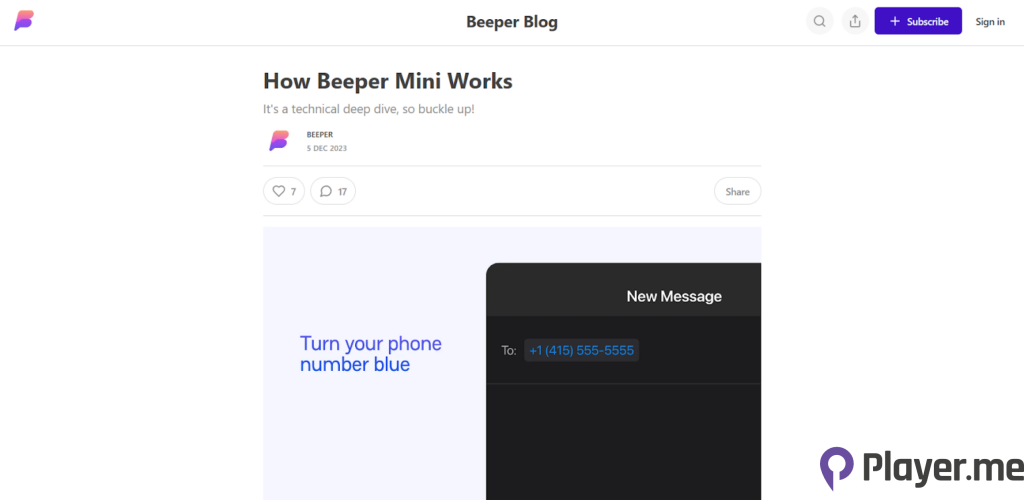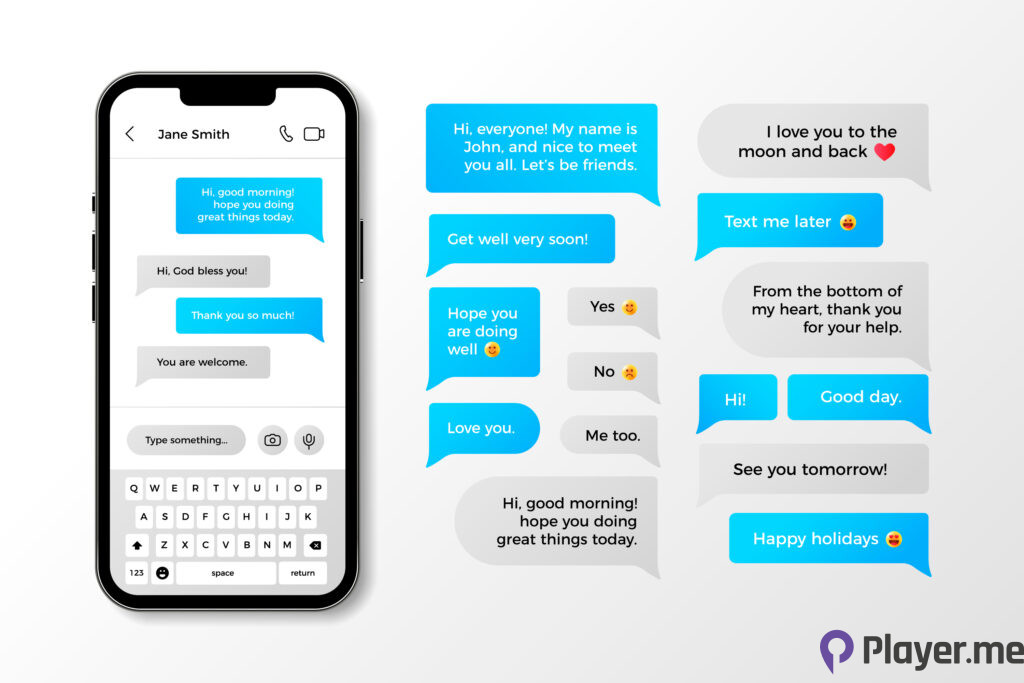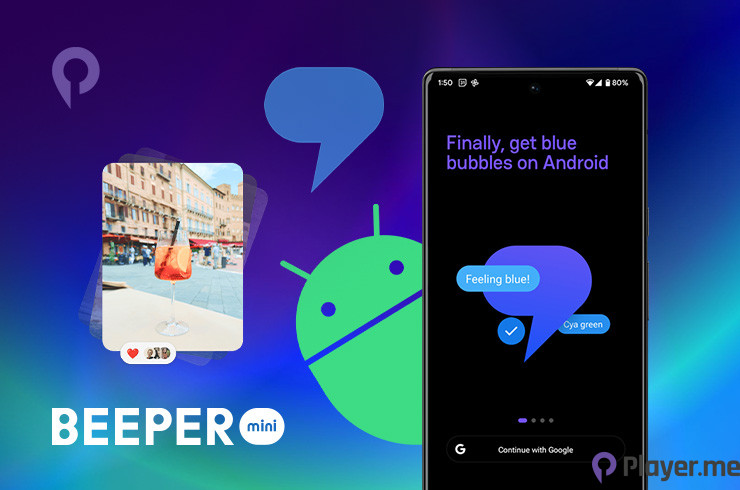Beeper has introduced Beeper Mini, an Android app that redefines the messaging landscape by seamlessly integrating iMessage into the Android experience. This development comes on the heels of a 16-year-old developer’s successful reverse engineering of Apple‘s iMessage protocol, opening the doors for Android users to enjoy the coveted blue bubble conversations without the need for a Mac intermediary.
The Genesis of Beeper Mini

The journey began when Eric Migicovsky, Beeper’s CEO, received a surprising DM from a teenage developer claiming to have cracked the iMessage code. Initially sceptical, Migicovsky’s disbelief turned into awe when he witnessed a working prototype that could send messages as blue bubbles directly from an Android device to Apple’s servers. This prototype laid the foundation for this game-changing Android app that has set the stage for a new era of cross-platform messaging.
The Mechanics and Security Behind Beeper Mini
Beeper Mini operates on a different paradigm compared to its predecessors. Unlike other iMessage-on-Android solutions that relied on relaying messages through a Mac server hosted in the cloud, this spectacular app achieves direct communication with Apple’s servers.
The app goes beyond a mere emulation of iMessage, successfully registering phone numbers with iMessage, sending messages directly to Apple’s servers, and receiving messages natively within the app. The complex process involved deconstructing Apple’s messaging pipeline, from sending and receiving messages to navigating the intricacies of Apple’s security protocols.
Security concerns have plagued previous attempts to bring iMessage to Android, but Beeper Mini takes a different approach. The team claims that the app doesn’t access user messages, contacts, or Apple ID passwords. Unlike its predecessors, Beeper Mini’s security model doesn’t require users to log in or relay messages through a third-party server, enhancing user trust and data privacy. To further bolster confidence, the app’s source code is open source, allowing users and security researchers to scrutinize the app’s inner workings.
The User Experience
Beeper Mini delivers a seamless user experience, successfully replicating iMessage features on Android devices. Messages sent through the app appear as blue bubbles on iPhones, and the app supports group chats, reactions, threads, photos, and videos. The transition from traditional SMS to iMessage is smooth, with almost no noticeable difference in functionality. The app’s ability to integrate iMessage without compromising the user experience has set it apart from previous attempts.
Subscription Model and Future Integration
The mobile app adopts a subscription-based model, with a nominal fee of $2 per month after a free seven-day trial. This approach aims to support ongoing app development, ensuring a sustainable and ad-free experience for users. The roadmap for the mobile app includes expanding its capabilities beyond iMessage.
The app is set to integrate other chat services such as WhatsApp, Messenger, Signal, SMS, and RCS, consolidating various messaging platforms into a single, user-friendly interface. This comprehensive approach aligns with Beeper’s long-term vision of creating an all-in-one messaging app that transcends platform boundaries.
Security and Trustworthiness in Focus
Beeper Mini addresses the scepticism surrounding third-party iMessage solutions by prioritising security. The app’s developers have taken proactive measures to ensure the integrity of the user data and have invited security researchers to scrutinise the app’s security features. The mobile application’s commitment to transparency and accountability stands as a testament to its dedication to providing a secure messaging solution for Android users.
Related: EU Inquires About Applying New Tech Regulations to Microsoft’s Bing and Apple’s iMessage
Potential Legal Challenges and Apple’s Response

The legality of Beeper Mini’s approach raises questions about potential legal challenges from Apple. While Beeper’s CEO believes the app is compliant with reverse engineering carveouts, the question of sustainability looms large. Apple’s protective stance on iMessage as a proprietary feature for its devices adds an element of uncertainty regarding the app’s future. The app’s success could hinge on its ability to coexist with Apple’s ecosystem without facing legal repercussions.
The RCS Factor and Apple’s Shift
Apple’s commitment to adopting the RCS messaging standard in 2024 adds an intriguing dimension to the narrative. While RCS promises improved interoperability between iOS and Android, Beeper Mini aims to carve a niche by offering an immediate solution for Android users who seek iMessage functionality. The article explores the potential impact of Apple’s RCS adoption on the demand for third-party iMessage solutions and how this unique app positions itself in this evolving landscape.
Beeper Mini’s Role in Messaging Evolution
Beeper Mini emerges as a transformative force in the realm of cross-platform messaging. Its successful integration of iMessage on Android, coupled with a robust security model, sets a new standard for third-party messaging apps. The app’s user-centric approach, commitment to transparency, and future roadmap position the app as a viable and innovative solution for Android users seeking the coveted blue bubble experience. As the messaging landscape continues to evolve, this one-of-a-kind Android app stands as a testament to the potential for seamless communication across diverse platforms.
Author Profile
Latest entries
 GAMING2024.06.12Top 4 Female Tekken 8 Fighters to Obliterate Your Opponents in Style!
GAMING2024.06.12Top 4 Female Tekken 8 Fighters to Obliterate Your Opponents in Style! NEWS2024.03.18Elon Musk’s SpaceX Ventures into National Security to Empower Spy Satellite Network for U.S.
NEWS2024.03.18Elon Musk’s SpaceX Ventures into National Security to Empower Spy Satellite Network for U.S. GAMING2024.03.17PS Plus: 7 New Games for March and Beyond
GAMING2024.03.17PS Plus: 7 New Games for March and Beyond GAMING2024.03.17Last Epoch Necromancer Builds: All You Need To Know About It
GAMING2024.03.17Last Epoch Necromancer Builds: All You Need To Know About It





